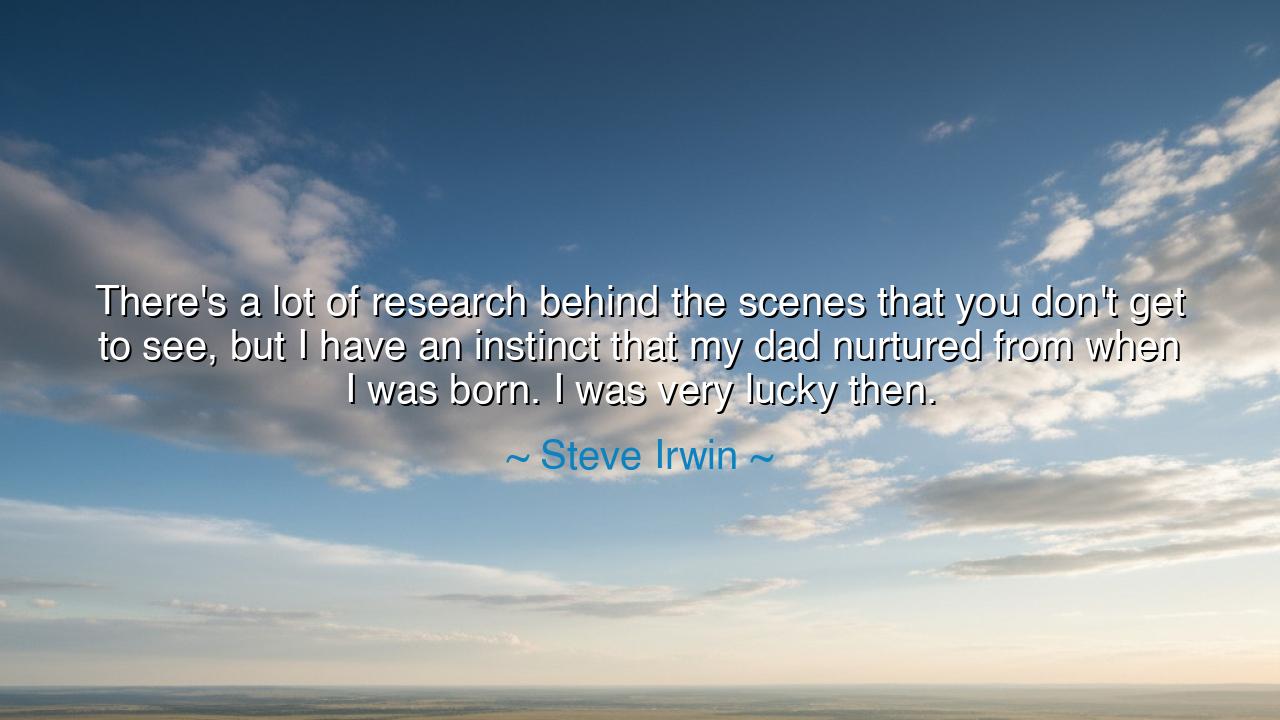
There's a lot of research behind the scenes that you don't get to
There's a lot of research behind the scenes that you don't get to see, but I have an instinct that my dad nurtured from when I was born. I was very lucky then.






In this reverent reflection, Steve Irwin, the beloved “Crocodile Hunter,” speaks not merely of skill or success, but of instinct — that sacred inheritance between father and son, teacher and student, man and nature. “There's a lot of research behind the scenes that you don't get to see, but I have an instinct that my dad nurtured from when I was born. I was very lucky then.” In these words, he reveals the quiet truth behind his wild and fearless life: that mastery is not born of recklessness, but of discipline guided by love, and that true understanding of the world begins not in the mind, but in the soul.
The meaning of this quote lies in its celebration of the unseen foundations of greatness — the discipline, guidance, and generational wisdom that shape instinct into art. Irwin’s life appeared to many as spontaneous, almost supernatural: he would move with snakes, wrestle crocodiles, and walk fearlessly among creatures that others feared. But here he reminds us that instinct is not a gift of magic, but of nurture — a living thread passed from his father’s hands to his own heart. His “luck,” as he humbly calls it, was not chance, but heritage — the patient education of the senses, the training of courage, the deep reverence for life that his father instilled in him since childhood.
The origin of Irwin’s instinct traces back to his father, Bob Irwin, a naturalist and herpetologist who raised Steve in the open classrooms of the Australian bush. From the time he could walk, Steve was learning — not from books, but from the earth itself. His father taught him to listen to the rustle of the grass, to read the language of movement, to recognize in the eyes of an animal not danger, but intent. This was his education: the school of patience, observation, and respect. When he speaks of “research behind the scenes,” he is acknowledging that wisdom is not only learned through study, but through years of humble experience and the loving mentorship of those who came before.
History has known other men and women whose greatness came from the same balance between instinct and teaching. Consider Leonardo da Vinci, who spent years dissecting birds and studying flight before he ever sketched his dream of wings. His genius seemed effortless, yet behind it lay countless hours of research and reflection. Or think of Bruce Lee, whose lightning-fast instincts in martial arts were not mere reaction, but the result of endless repetition and deep self-awareness. So too with Irwin — his wild dance with crocodiles was not chaos, but choreography, born of both study and spirit. He reminds us that true instinct is not the absence of thought, but the union of knowledge and intuition.
There is also a deeper, spiritual truth within Irwin’s words: that the bond between parent and child is itself a form of nature’s wisdom. His father did not merely teach him facts — he nurtured trust, confidence, and wonder. He gave him the freedom to explore and the strength to return. The nurturing of instinct is not about control; it is about awakening awareness, teaching one to see what others overlook, to move in harmony with life rather than in conquest of it. This is the same lesson the ancients taught their warriors, their sailors, and their philosophers: that knowledge without instinct is blind, and instinct without knowledge is dangerous. Only together do they form wisdom.
The lesson here for all who listen is clear: honor both your mentors and your inner voice. Behind every act of brilliance lies unseen labor — the quiet discipline, the long years of guidance, the patient shaping of instinct. Do not be deceived by appearances; what looks effortless has been earned in silence. And if you are a parent, teacher, or guide, remember Bob Irwin’s example — nurture the natural gifts of those you love, for within every child lies an instinct waiting to be awakened. Greatness is not forced; it is cultivated with care and faith.
Therefore, my child, take Steve Irwin’s words to heart. When you see a master move with ease, remember the hidden roots of his mastery. When you act, act not from impulse, but from instinct refined by learning. When you teach, do so with patience, for the smallest lesson may ignite the greatest fire. Above all, be grateful for those who have nurtured your gift — as Steve was for his father — and carry their wisdom forward with humility. For instinct, when guided by love and knowledge, becomes more than skill: it becomes harmony with life itself, the rarest and noblest inheritance of all.






AAdministratorAdministrator
Welcome, honored guests. Please leave a comment, we will respond soon